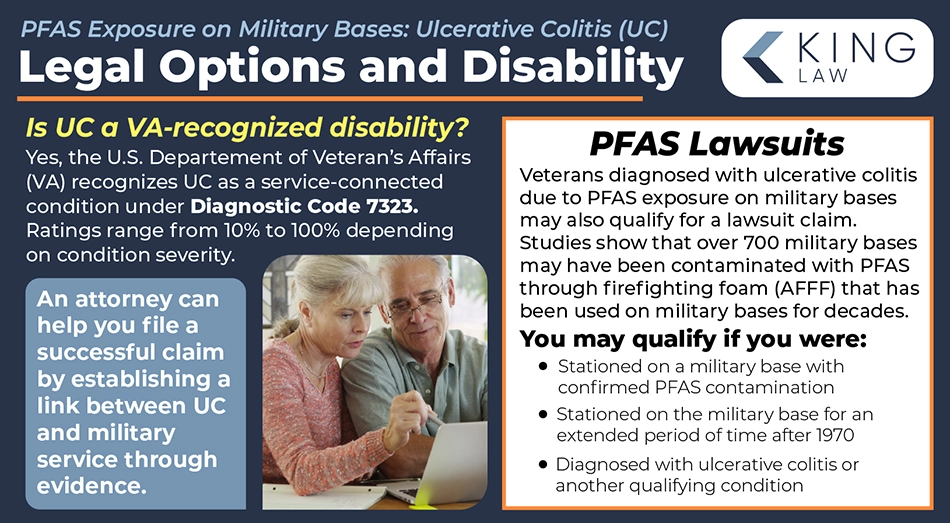
Research shows that current and former military service members may be at an increased risk for developing a type of inflammatory bowel disease known as ulcerative colitis. It is believed that the increased risk may come from service members’ exposure to per– and polyfluoroalkyl substances (PFAS) on military bases around the world. PFAS, which are known as forever chemicals, are common ingredients in products the military has used for decades—most notably aqueous film-forming foam (AFFF) fire-fighting foams.
Service members were often exposed to PFAS through contaminated water. New studies have linked exposure to PFAS with a higher chance of developing ulcerative colitis. Affected servicemembers, veterans, and their families, are encouraged to seek legal counsel for a consultation about their rights and legal options.
About Ulcerative Colitis and Military Service:
About Ulcerative Colitis and Military Service
Ulcerative Colitis Causes and Risk Factors
PFAS Exposure on Military Bases
Health Effects of PFAS Exposure
The Connection Between PFAS and Ulcerative Colitis
VA Disability Benefits for Ulcerative Colitis Linked to PFAS Exposure
About Ulcerative Colitis and Military Service
Ulcerative colitis is a form of inflammatory bowel disease that primarily affects the inner lining of the large intestine (i.e., the colon and the rectum). In most cases, it causes inflammation and ulcers. If left untreated, the condition can significantly impact a person’s quality of life and may cause life-threatening complications. There is currently no known cure for the disorder, but there are several ways to treat the symptoms of the long-term condition.
Signs and symptoms of ulcerative colitis:
- Diarrhea
- Abdominal pain
- Rectal bleeding
- Weight loss
- Fatigue
- Fever
- Cramping
- Mucus in stool
- Joint pain
- Anemia
- Loss of appetite
Many veterans who have been diagnosed with ulcerative colitis are encouraged to seek legal counsel. Comprehensive research shows that military service members may be at an increased risk of ulcerative colitis because of chemical exposure, including PFAS exposure at bases throughout the world.
Ulcerative Colitis Causes and Risk Factors
There are several potential causes of ulcerative colitis. Most doctors agree that the condition can be a combination of environmental, genetic, and immune system factors. Veterans, however, may be at an increased risk because of exposure to perfluoroalkyl or polyfluoroalkyl substances (PFAS).
Suspected causes and risk factors of ulcerative colitis:
- Age or race
- Genetic predisposition
- Having an autoimmune disorder
- Exposure to toxic chemicals, including PFAS
- Microbiome factors

PFAS Exposure on Military Bases
Per- and polyfluoroalkyl substances (PFAS) refer to a group of synthetic or human-made chemicals known for their resistance to heat, water, and oil. They are considered “forever chemicals” because of their persistence in the environment. Studies show that PFAS exposure can lead to adverse health conditions, including ulcerative colitis and other digestive issues.
The U.S. government has admitted to using products that contained PFAS. In particular, the military used aqueous film-forming foam (AFFF) in fire-fighting operations for decades. Run-off from the foam is believed to have contaminated the soil and water supply at military bases nationwide. The EPA has recognized that drinking water contaminated with PFAS can pose serious risks to human health and has proposed limits on levels for drinking water.
Service members who worked with AFFF or consumed contaminated drinking water are therefore at a higher risk of PFAS exposure and may be more prone to ulcerative colitis and other gastrointestinal conditions.
PFAS exposure can also have negative impacts on a person’s immune system and reproductive health and lead to conditions such as thyroid disease, kidney cancer, or testicular cancer,
Military Bases with Known PFAS Contamination
In 2020, the Department of Defense released a progress report for its PFAS task force. According to the report, over 650 Defense Department and National Guard military installations had the potential for PFAS release into water supplies. It is now believed that over 700 military installations may be at risk for PFAS contamination. Current or former service members who may have been affected by Military Base Water Contamination are encouraged to seek legal counsel.
Well-known military bases with known or potential PFAS contamination:
- Camp Pendleton
- Eglin Air Force Base
- Fort Bragg
- Fort Jackson
- Fort Meade
- Fort Ord
- Kirtland Air Force Base
- McClellan Air Force Base
- Pearl Harbor/Hickam Air Force Base
- Travis Air Force Base
- Many others
Members of the Navy may be at increased risk of PFAS exposure, as AFFF fire-fighting foams were often used to extinguish liquid fuel fires. This means current and retired members of the U.S. Navy may be at increased risk of ulcerative colitis.
Health Effects of PFAS Exposure
A study published in the Journal of Exposure Science & Environmental Epidemiology explored the potential health effects of exposure to PFAS-contaminated water. Exposure to PFAS was linked with various adverse health issues, including cancer, autoimmune diseases, gastrointestinal disorders, and reproductive issues. While the exact mechanism of how exposure to PFAS may cause these conditions is unknown, it is believed that the toxic chemicals may disrupt the immune system, causing chronic inflammation in the body. Inflammation in the colon and rectum is linked with inflammatory bowel disease and ulcerative colitis.
The Connection Between PFAS and Ulcerative Colitis
Studies, including a report posted by the National Academies of Sciences, Engineering, and Medicine (NASEM), suggest a link between PFAS exposure and a number of serious health conditions, such as ulcerative colitis, a type of inflammatory bowel disease. Veterans, particularly those stationed at military bases contaminated with PFAS, may be at an increased risk for these conditions. It is believed repeated exposure to water contaminated with PFAS-containing products such as run-off from AFFF may make them more susceptible to ulcerative colitis and other adverse health issues.
VA Disability Benefits for Ulcerative Colitis Linked to PFAS Exposure
Depending on the situation, veterans may qualify for disability benefits if they suffer from ulcerative colitis due to PFAS exposure. Current or former service members afflicted with inflammatory bowel disease are strongly encouraged to seek legal counsel if they have been diagnosed or are receiving treatment for the condition.
Is Ulcerative Colitis a VA-Recognized Disability?
The U.S. Department of Veterans Affairs (VA) recognizes ulcerative colitis as a service-connected condition under Diagnostic Code 7323. Ratings for the inflammatory bowel disease range from 10% to 100%, depending on the severity of the condition and how it has impacted a person’s quality of life. The rating is similar to what is used for Crohn’s Disease.
Ulcerative colitis VA disability ratings:
- 10% Rating: Mild symptoms or flare-ups that can be generally managed with oral or topical agents.
- 30% Rating: Mild to moderate symptoms with daily episodes of diarrhea and minimal signs of toxicity.
- 60% Rating: Moderate symptoms managed through immunosuppressants. Characterized by four to five episodes per day of diarrhea and moderate signs of toxicity, such as fever and anemia.
- 100% Rating: Severe symptoms that deeply impact a person’s quality of life and are not responsive to treatment. Marked by six or more episodes of diarrhea or rectal bleeding per day that may require hospitalization.
How to Prove Service Connection for PFAS-Related Ulcerative Colitis
In order to file a successful VA disability claim for ulcerative colitis, you will need to gather evidence to support your case. An attorney can help to determine what evidence may be necessary, but it is essential that you establish a link between the condition and your military service. Evidence that may prove critical in your case includes your medical records, military service history, and proof of exposure at a military base known for PFAS contamination.
Filing a VA Disability Claim for Ulcerative Colitis
There are several steps to filing a VA disability claim for ulcerative colitis. It is imperative to work with a qualified attorney to ensure that you are eligible to take legal action, all requirements are met, and the necessary documentation is collected.
Steps to filing a VA disability claim for ulcerative colitis:
- Consult with an attorney: The first step in filing a VA disability claim for ulcerative colitis is to consult with an experienced attorney. An attorney can help provide guidance throughout the process and ensure all legal requirements are met prior to filing.
- Determine eligibility: During your initial consultation, an attorney can help to determine whether you are eligible to file a claim. They will review your case and assess how to proceed.
- Gather the necessary evidence: One of the biggest challenges veterans face when filing a claim is proving a connection between their military service and their ulcerative colitis. Providing evidence is often critical to ensuring a successful claim. Documents that may be necessary to substantiate your claim include your medical records, military service records, and expert medical opinions regarding your diagnosis and the cause of the condition.
- File the claim: With the necessary evidence in hand, your attorney can file the claim. Prior to filing, they will ensure that all legal requirements are met. If your claim is denied or under-evaluated, your attorney can help you navigate the appeal process, if applicable to your case.

Legal Options for Veterans Affected by PFAS Exposure
Veterans who were adversely affected by PFAS exposure may be entitled to seek compensation through a lawsuit against PFAS manufacturers. It is believed that water at military bases throughout the world may have been contaminated by run-off from a fire fighting foam, known as AFFF, used for decades. Studies show that AFFF contains PFAS or toxic chemicals that can cause harm to humans and the environment.
PFAS Lawsuits and Settlements
One of the legal options available to veterans is to file a personal injury or product liability lawsuit against the manufacturers of products containing PFAS, such as AFFF. Manufacturers, including 3M, DuPont, and Chemours, have come under scrutiny for failing to warn consumers about the potential harm associated with PFAS exposure. Thousands of lawsuits have been filed against companies that made AFFF products containing these toxic chemicals, with more expected to be filed in the coming months and years. In April 2024, 3M agreed to an over $10 billion settlement to resolve claims related to contaminated public water supplies. Chemours and DuPont have also agreed to settlements related to these claims.
Can Veterans Sue for PFAS-Related Health Issues?
Veterans may be able to sue manufacturers of products containing PFAS for their related health issues. One of the most common lawsuits involves manufacturers of aqueous film forming foam (AFFF), a firefighting foam agent used for decades by the military. Veterans affected by PFAS-related health conditions, such as ulcerative colitis, may be able to file personal injury claims or join mass tort litigation. Families of deceased veterans may be able to file wrongful death lawsuits on behalf of their loved ones.
Steps to Take if You Believe PFAS Exposure Caused Your Ulcerative Colitis
If you believe your ulcerative colitis was caused by PFAS exposure at a military base, you might be able to take legal action, including filing a VA disability claim or a lawsuit against the manufacturer.
What to do if you believe your ulcerative colitis was caused by PFAS exposure:
- Seek a medical evaluation: If you have symptoms such as rectal bleeding or daily episodes of diarrhea, you may have an inflammatory bowel disease known as ulcerative colitis. It is important to seek a diagnosis and prompt treatment for this condition. Untreated the disease may have life-threatening complications.
- Consult with an attorney: One of the most important steps is to consult with an attorney. An attorney can help determine whether you are eligible to take legal action. They will also help guide you through the legal process and work to ensure you receive the largest possible recovery or benefit.
- Gather information: With the help of your attorney, you should gather the necessary documents to strengthen your case. These documents include your medical records, proof of military service, expert medical opinions, and research indicating PFAS contamination at a base you were stationed or worked at.
- Consider joining advocacy efforts: Veterans affected by ulcerative colitis may be aided by joining advocacy efforts that help to raise awareness about PFAS-contamination at military bases and support litigation.
Contact a PFAS Lawyer Today
Veterans diagnosed with ulcerative colitis that they believed may have been caused by PFAS contamination are encouraged to contact King Law today. Many servicemembers and their families were exposed to contaminated drinking water at military bases. After protecting our country, many people are suffering from conditions related to chemical exposure during their service. Our firm and legal partners are ready to fight for you.

